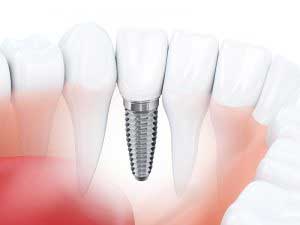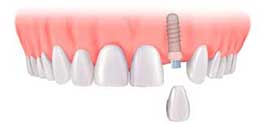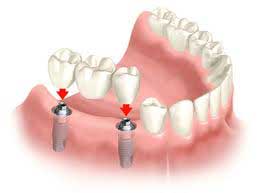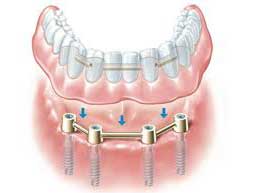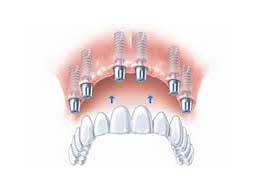Dental Implants
Dental implants services in Finchley
What is a dental implant?
A dental implant is a small titanium screw that serves as the replacement for the root portion of a missing natural tooth. Dental implants can be placed in either the upper or lower jaws. Due to the biocompatible properties of titanium, a dental implant fuses with the bone and becomes a good anchor for the replacement tooth. Dental implants can be used to replace single or multiple missing teeth.
Many people who consider implants have removable dentures for lower and upper jaws or conventional bridges. These people experience a significant improvement in their ability to chew food comfortably after their dental implant treatment.
The advantages of implants:
Implants have many advantages over other methods of replacing teeth such as dentures. The following are the main advantages.
- Prevent bone resorption - As implants act like natural teeth, they retain the structure of the jawbone and help prevent bone resorption, so you can maintain a more youthful look.
- Protect remaining teeth - Dental implants help to maintain a stable bite by keeping the other teeth in place, preventing them becoming misaligned.
- Prevent preparation of adjacent teeth - Traditional bridgework requires teeth to be filed down. Implants avoid this problem.
- Easy to clean - An implant is easy to clean and does not need an attachment that can cause damage to neighbouring teeth.
- Comfortable
Implants have four applications:
Single tooth replacement, multiple tooth replacement, denture stabilisation, and full mouth reconstruction.
- Single tooth replacement - Replace a missing front tooth with an implant and a crown.
- Multiple teeth replacement - Replace multiple teeth in a row with implant supported bridgework.
- Denture stabilisation - Stabilise your dentures with dental implants.
- Full mouth reconstruction - Restore your mouth completely with implants.
How are implants placed?
Implants are placed in a four-step procedure, which is detailed below:
- Step 1. Initial consultation - During an initial consultation, we assess your teeth, gums and the condition of your jaw bone so we can create a tailor-made treatment plan. If we decide your jaw bone is not able to support implants, you may need bone grafting to ensure that it can.
- Step 2. Surgery - A small cut is made in the gum and the titanium post (implant) is carefully inserted. An anaesthetic during surgery will ensure that this process is comfortable and pain free.
- Step 3. Osseointegration - In most cases the implant is then left for between 3-6 months while it fuses with the bone – a process known as “osseointegration”.
- Step 4. Attachment of the crown or bridge - Once integrated, the implant can be uncovered and your new replacement tooth attached to restore your bite and smile.
Why should I get implants?
Dental implants are a safe, natural-looking solution to missing teeth and ill-fitting dentures that not only produce wonderfully restored smiles but can also be beneficial to your overall oral health.
They can also eliminate problems associated with tooth loss or denture wear, such as low self-confidence, speech problems and chewing difficulties.
Overall, implants are an excellent solution for anyone with missing teeth.
How long do implants last?
To ensure their longevity, you need to treat them just like your natural teeth, which means brushing and flossing and making sure you keep up to date with your dental check-ups.
© 2024. The content on this website is owned by us and our licensors. Do not copy any content (including images) without our consent.

